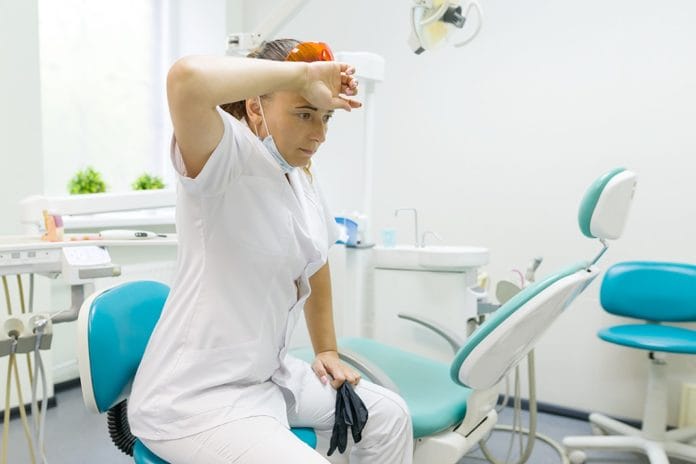Regardless of how long you have been working as a dental hygienist, at some point you may have felt that you were just done and over it all! If the thought of scaling one more piece of calculus, flipping one more room, or reviewing a treatment plan makes you literally want to run out the door screaming all the way home, take solace in the fact that you are not alone.
Many professions claim burnout exists among workers, and dental hygiene is no exception. These feelings of burnout are very common. The practice of dental hygiene can be wonderfully rewarding and very empowering. It also has its share of drawbacks:
- Difficult/non-compliant patients
- The feeling that production numbers trump patient care
- Physical wear and tear on our bodies
- Long days
- Lack of teamwork
Studies show that as many as 21% of hygienists feel that they are affected by burnout. Factors that influenced the study results included, patient load per day, perceptions about appointment lengths, team support or lack thereof, interaction with peers, and the states where hygienists practiced. These thoughts and feelings of burnout are valid and apparently are felt by hygienists in all states.
You may be asking yourself, what is burnout? The medical definition is: exhaustion of physical or emotional strength or motivation usually as a result of prolonged stress or frustration. Is this you? Are you truly experiencing these symptoms? I urge you to stop and re-evaluate. Maybe it isn’t truly burnout, but instead, you may just be “bummed out with things as they are” at this moment in time.
Think back to when you first received your license and the excitement that surrounded each new hygiene experience. We may not be able to capture that same youthful exuberance and vigor of when it was brand new, but we can certainly try. Just making the effort to be more intentional about every clinical interaction can help you to refocus on what you love about dental hygiene and the clinical experience.
Sometimes, we get complacent or bored with day-to-day procedures and can feel that we are just engaged in autopilot from patient to patient. Where’s the fun in that? We owe it to ourselves and our patients to be engaged and intentional about their care. Being more intentional and focused on the problems we note during our clinical evaluations − whether it’s simple plaque accumulation that involves specific OHI instructions or a more involved xerostomia issue that requires research to establish why it is happening − can help you engage more with patients by using your education and clinical expertise.
How New Directions Can Rejuvenate Careers
Perhaps these feelings are a result of the office where you work. If your vision doesn’t match the vision of the team, this can cause an internal conflict and unhappiness within your workplace. Sometimes an office is just not a good fit for you, and vice versa. And, that is okay!
I’ve known of situations where the hygienist switched offices and that was all that was needed for the hygienist to feel fulfilled and appreciated. Spencer Johnson, the author of “Who Moved My Cheese,” pointedly observed, “Movement in a new direction helps find new cheese.”
- New or different instruments or products can help to be the catalyst some hygienists need to be invigorated about patient care again.
- If your body is letting you down and contributing to the problem, make sure you are getting plenty of rest, exercise regularly, and consider chiropractor visits or regular massages for those sore neck and back issues. Let’s face it, if you feel better, that always tends to make things better.
- Maybe listening to podcasts about hygiene topics will help to ignite your desire to learn and grow more.
- Possibly becoming affiliated and active within your local ADHA organization, volunteering at nursing homes or schools, or being involved in mission trips when possible can spark the passion again for this awesome profession.
If all else fails and you are still feeling the pull to lie the scaler down, maybe that is best. It doesn’t have to be permanent, but moving out of the clinical arena for a while could be the breather that is needed. Several opportunities for hygienists are outside of the clinical role, including educator, sales representative, research and development, speaker, author, and entrepreneur.
Don’t be complacent to just show up, you owe it to yourself to be active and happily engaged in whatever you choose to do! Here’s to many more days of happy hygiene!
Before you leave, check out the Today’s RDH self-study CE courses. All courses are peer-reviewed and non-sponsored to focus solely on high-quality education. Click here now.











